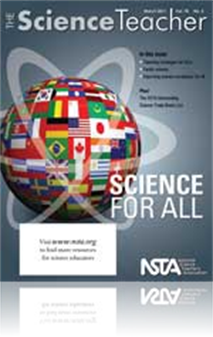All The Science Teacher resources
Journal Article
Teaching new biology concepts to ninth graders can be tough, and teaching students with disabilities even tougher—but we are accountable for all students. These authors used a cooperative learning strategy called Collaborative Strategic Reading in ...
Journal Article
Editor's Corner: Our Science Report Card
Despite some gains, significant disparities in achievement remain a major challenge for educators and schools. In this month's column, TST's Field Editor presents the results of the most recent National Assessment of Educational Progress—the "Natio...
Journal Article
A Learning Cycle for All Students
The National Science Education Standards are designed to provide a vision of scientific literacy for all students—regardless of age, race, ethnic background, English-language proficiency, socioeconomic status, disability, or giftedness. One of the ...
Journal Article
Teaching Science to ELLs, Part II
Despite the burgeoning numbers of English language learners (ELLs) in our schools, many science teachers have little training in meeting their specialized needs. By the year 2010, it is estimated that 40% of K–12 classrooms in the United States wil...
Journal Article
Teaching Science to ELLs, Part I
Since 1995, the population of English language learners (ELLs) in the United States has increased by an astonishing 57% (Maxwell 2009). Though ELLs come from many different backgrounds, they share the common challenge of learning English while respon...
Journal Article
Outstanding Science Trade Books for Students K–12 (Books published in 2010)
What makes an outstanding book for a young reader? Although it would be hard to create a rubric for every book, experienced teachers recognize them quickly. They fascinate and captivate with both their content and style. Award-winning trade books ins...
Journal Article
Idea Bank: Selecting Software for Students With Learning and Other Disabilities
Have you ever bought a computer program that you thought would be great for your struggling students, only to find that it did not work on your school computers, or that your students found it difficult to use? Selecting science software for students...
Journal Article
The New Teacher's Toolbox: Combating Cheating in the Classroom
Cheating is nothing new—students have been finding ways to do it for years. Though you'll never be able to catch every cheater, there are some steps you can take to minimize cheating in your classroom. This month's column provides tips that take li...
Journal Article
Safer Science: Math Classes and Study Halls in Science Labs?
These days, science labs are often assigned to nonscience employees and classes at least one period a school day. Is this a prudent decision safety-wise? Is it legal? This month's column presents three scenarios and examines applicable legal standard...
Journal Article
Creating a College-Going Culture
Research indicates that increased parental involvement has a positive impact on student achievement, especially among Hispanic students (Zarate 2007; NSTA 2010). This author helped science teachers at Falfurrias High School in Falfurrias, Texas, impl...


